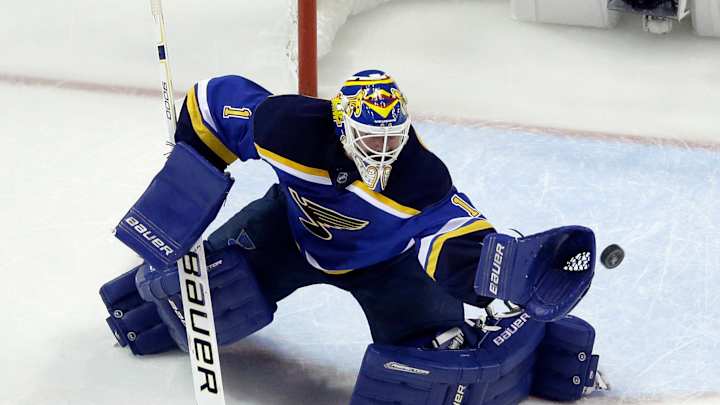NHL teams must consider expansion draft in offseason plans

Brad Treliving saw the rules for the expansion draft and immediately was in an advantageous position. The Calgary Flames' general manager needed a goaltender, and with Las Vegas set to harvest the NHL for two of them in a year, his colleagues had incentive to make a move.
The Flames got Brian Elliott from the St. Louis Blues for a second-round pick.
A full year before the Las Vegas expansion draft, GMs must plan for the inevitability of losing a player to a team that the league wants to be good out of the gate. Already the impact of the impending expansion draft has been felt with the Flames acquiring Elliott and the Toronto Maple Leafs getting goalie Frederik Andersen from the Anaheim Ducks.
The Ducks knew they wouldn't be able to keep Andersen and John Gibson forever, and the expansion draft expedited a move.
''After starting to hear what the expansion rules could be, you just knew you weren't going to be signing both of them,'' GM Bob Murray said. ''You're going to come out looking pretty stupid if you did that.''
That will be the challenge over the next 12 months.
Teams can only protect one goalie, so the Tampa Bay Lightning will likely have to trade Ben Bishop and the Stanley Cup-champion Pittsburgh Penguins must decide what to do with Marc-Andre Fleury before the yet-to-be-named Las Vegas team picks its first 30 players on June 20, 2017.
With the unrestricted free agent market opening Friday, teams have to consider the expansion draft as part of their offseason maneuvers.
''Everything will be affected by that,'' Columbus Blue Jackets GM Jarmo Kekalainen said. ''In every decision, we'll have to take into consideration what the rules are and how that might affect our outlook for the expansion draft and ahead of that.''
Each team will be able to protect seven forwards, three defensemen and one goaltender or eight skaters and one goaltender. Any player with a no-movement clause in his contract must be protected, and each team will lose one player.
Players with bloated contracts or who are past their prime will be exposed, but teams could take a serious hit because young and cheap talent will be plentiful.
That's a danger for a team like the Chicago Blackhawks, who have won the Stanley Cup three times in seven years but are locked into long-term deals with their core players. GM Stan Bowman, who has taken Chicago from the brink of cap purgatory back to the Cup, isn't worried about losing someone.
''I think sometimes you can get too worked up about it,'' Bowman said. ''It's a little bit early to be making moves strictly for an expansion draft that's going to happen in about 12 months from now.''
Win-now teams shouldn't get worked up. Penguins GM Jim Rutherford plans to keep Fleury and Cup-winning goalie Matt Murray for now and worry about it later, and making moves for the future alone won't help anyone capture a title next season.
''It's tough to take a player you like out of your lineup right now before the season starts, especially if you want to compete for a championship,'' Washington Capitals GM Brian MacLellan said. ''You try and find that perfect situation where you're protected in an expansion draft.''
Expect some movement once teams have a grip on which players they might protect or have in danger of exposing for the NHL's Las Vegas venture. The Blackhawks have eight players with no-move clauses and the Blue Jackets six, which could necessitate buyouts this week or deals over the next year.
''Nobody could really prepare before they knew what the rules were,'' Kekalainen said. ''Some teams are in better positions just by accident or by luck or whatever.''
Edmonton Oilers GM Peter Chiarelli, who can relax with Connor McDavid exempt because he'll only have two years of pro experience, said teams will have to think differently if they face the potential of losing a significant player. No doubt that's a reality for some, but Treliving doesn't see that flooding the market.
''That idea that now that there's expansion everybody's going to be dying to just give you players, that's not quite the case,'' Treliving said. ''There is obviously a knowledge of what may happen, so people are trying to see if they can be aggressive or if that's going to be something in a year.''
---
AP Hockey Writer John Wawrow in Buffalo, New York, contributed to this report.
